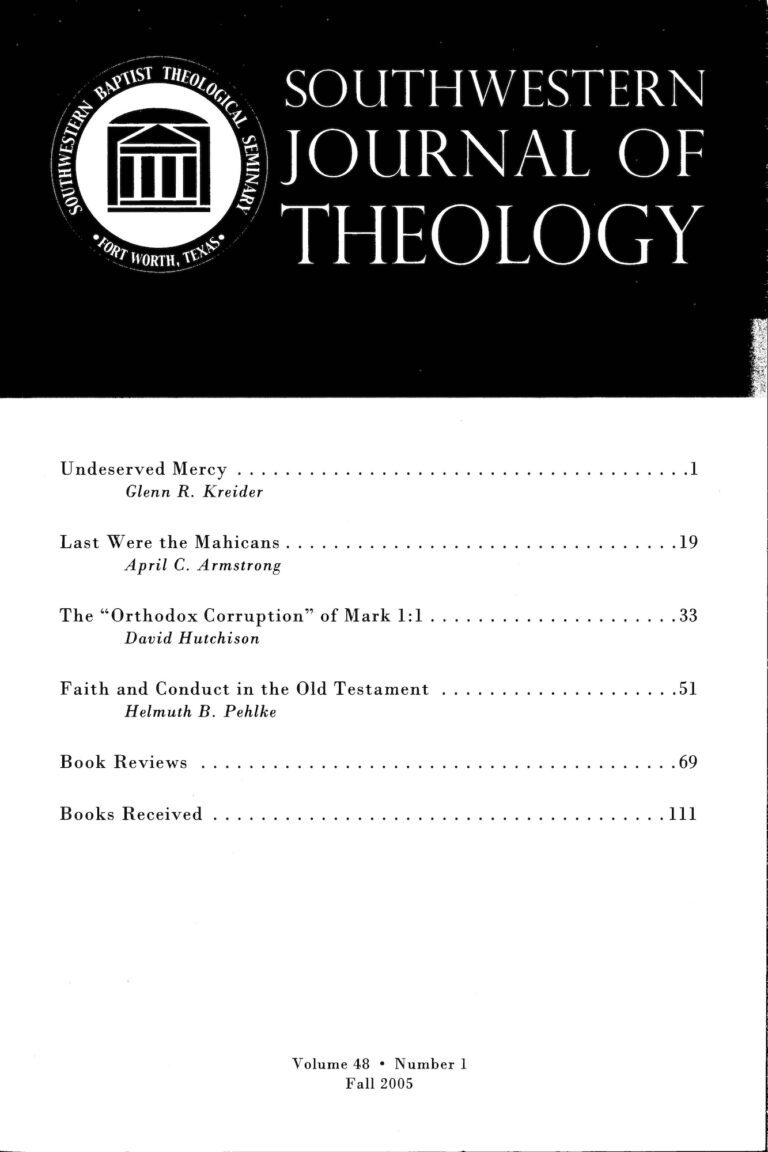
Southwestern Journal of Theology (48.1)
Southwestern Journal of Theology
Volume 48, No. 1 - Fall 2005
Editor: Paige Patterson
By Mark Lewis Taylor. Minneapolis: Augsburg Fortress, 2005. 192 pages. Softcover, $16.00.
In Religion, Politics, and the Christian Right, Mark Lewis Taylor argues that the Christian right has leveraged post 9/11 nationalism to promote imperialistic and authoritarian policies that are more Manichean than Christian (24). The Christian Right is defined consistently throughout the book as a subset of the broader conservative and neo-conservative segments of the Republican Party. This religious subset has seized upon terrorist events to promote a political romanticism: A myth that America is a unique nation with a cause that transcends her boarders.
The events of 9/11 united two fundamentally divergent segments of the broadly conservative political landscape: Neo-conservatives and religious conservatives. While divergent in religious conviction both are united in their adherence to American exceptionalism which, following 9/11, resulted in two socio-political phenomena—belonging and expectation.
The Christian Right promotes an ideology and political agenda wherein Americans are a special nation whose calling is unique. This calling, to conquer evil, and to spread democracy and freedom, contributes to American unilateral foreign policy. In addition to a sense of belonging, exceptionalism promotes a social expectation of economic optimism and material gain. Thus, exceptionalism blends a concoction of nationalism and consumerism resulting in unilateralism and corporate greed, both promoted by the ideology of the Christian Right.
American romantics take the myth of exceptionalism from cold war political rhetoric. Neo-conservatives are committed to interventionist foreign policy yet without the communist threat of the cold war they lack an effective message to leverage public opinion. However, following the events of 9/11, the religious right was able to wed neo-conservative ideas with the sacred language of evangelical theology: Divine favor and purpose, good versus evil, faith and patriotism, prayer, etc. In addition to sacred language, sacred symbols were utilized for a rally-around-the-flagpole effect. The cross and the flag became inseparable symbols of political and military power. Consequently, two cultures collided, resulting in a religious culture of war, torture, power, and domination.
Taylor’s recommendation is two-fold. First, the myth of romanticism must be deconstructed. Second, a new myth of radical liberalism must be created, in which the values of power, purchase, and domination are exchanged for the counter-imperial values of liberation, reconciliation, and peace.
Taylor’s assessment is simultaneously attractive and disappointing. It is a worthy project to separate the Christian faith from unrighteous political appropriation. The Christian community should think critically about its role in poverty, war, and consumerism. Evangelical Christians in particular must come to terms with the implications of the Gospel in regard to social justice.
At his best Taylor comes across in the vein of John Howard Yoder, seeing the Christian community as that which defies empire. The power of the Gospel, on this view, does not easily coincide with militarism and injustice. At other times he argues like Gustavo Gutierrez, appearing to reduce the atonement to a moral example and (by way of a naturalistic historical interpretation) negating the ongoing sovereignty of God over the affairs of humankind. Most troubling is that Taylor sees the Gospel as a message to appropriate rather than proclaim (158). Furthermore, his hermeneutic of suspicion comes across, at times, as conspiracy.
Despite its noble aim, this book is disappointing. For all his talk of myth construction, Taylor offers little as to what would ground his myth or make it more beneficial than that of the political romantics. Without a correspondence theory of truth, he is left with two rival theories and no readily available manner of adjudication.
While Taylor has a legitimate critique of the Christian Right, he doesn’t connect his socio-political interpretation with scripture, or indeed to reference the scripture in any substantial way. This fact will undoubtedly undermine the value of the book for some pastors and seminary students. Despite its shortcomings, this book is a thorough (if ultimately failed) critique of religion and politics that is worth reading.





